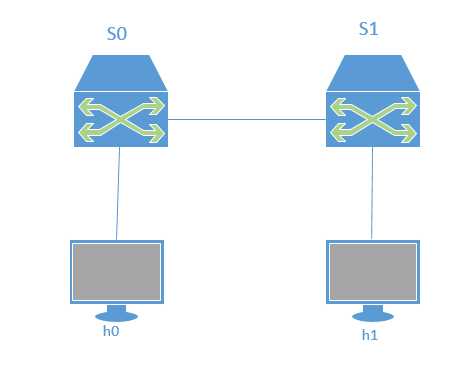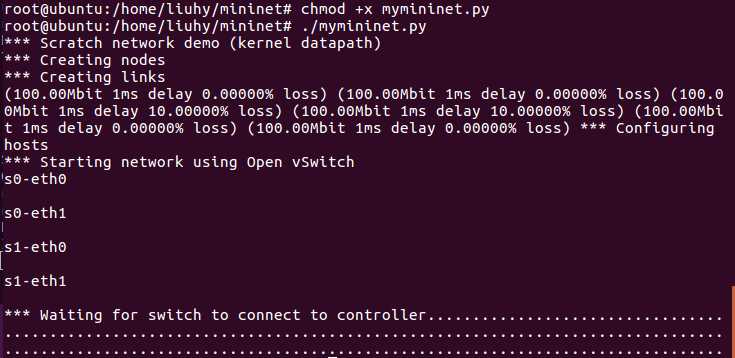标签:details 链路 ever redis imp 控制器 event branch tip
还记不记得我们用python脚本写拓扑时,可以设置链路的损耗率,现在我们就要通过实验来测试这个损耗率。

在该环境下,h0向h1发送数据包,由于在mininet脚本中设置了连接损耗率,在传输过程中会丢失一些包,本次实验的目的是展示如何通过控制器计算路径损耗速率(h0-s0-s1-h1)。这里假设控制器预先知道网络拓扑,所以我没有显示发现网络的代码以及其他相关代码。控制器将向s0和s1发送flow_stats_request,当控制器接收到来自s0的response时,将特定流的数据包数保存在input_pkts中,当控制器接收到来自s1的response时,将接收到特定流的数据包数保存在output_pkts中,差值就是丢失的数据包数量。
touch test.py
vim test.py
#!/usr/bin/python
from mininet.net import Mininet
from mininet.node import Node
from mininet.link import TCLink
from mininet.log import setLogLevel, info
from threading import Timer
from mininet.util import quietRun
from time import sleep
def myNet(cname=‘controller‘, cargs=‘-v ptcp:‘):
"Create network from scratch using Open vSwitch."
info( "*** Creating nodes\n" )
controller = Node( ‘c0‘, inNamespace=False )
switch = Node( ‘s0‘, inNamespace=False )
switch1 = Node( ‘s1‘, inNamespace=False )
h0 = Node( ‘h0‘ )
h1 = Node( ‘h1‘ )
info( "*** Creating links\n" )
linkopts0=dict(bw=100, delay=‘1ms‘, loss=0)
linkopts1=dict(bw=100, delay=‘1ms‘, loss=10)
link0=TCLink( h0, switch, **linkopts0)
link1 = TCLink( switch, switch1, **linkopts1)
link2 = TCLink( h1, switch1, **linkopts0)
#print link0.intf1, link0.intf2
link0.intf2.setMAC("0:0:0:0:0:1")
link1.intf1.setMAC("0:0:0:0:0:2")
link1.intf2.setMAC("0:1:0:0:0:1")
link2.intf2.setMAC("0:1:0:0:0:2")
info( "*** Configuring hosts\n" )
h0.setIP( ‘192.168.123.1/24‘ )
h1.setIP( ‘192.168.123.2/24‘ )
info( "*** Starting network using Open vSwitch\n" )
switch.cmd( ‘ovs-vsctl del-br dp0‘ )
switch.cmd( ‘ovs-vsctl add-br dp0‘ )
switch1.cmd( ‘ovs-vsctl del-br dp1‘ )
switch1.cmd( ‘ovs-vsctl add-br dp1‘ )
controller.cmd( cname + ‘ ‘ + cargs + ‘&‘ )
for intf in switch.intfs.values():
print intf
print switch.cmd( ‘ovs-vsctl add-port dp0 %s‘ % intf )
for intf in switch1.intfs.values():
print intf
print switch1.cmd( ‘ovs-vsctl add-port dp1 %s‘ % intf )
# Note: controller and switch are in root namespace, and we
# can connect via loopback interface
switch.cmd( ‘ovs-vsctl set-controller dp0 tcp:10.0.0.13:6633‘ )
switch1.cmd( ‘ovs-vsctl set-controller dp1 tcp:10.0.0.13:6633‘ )
info( ‘*** Waiting for switch to connect to controller‘ )
while ‘is_connected‘ not in quietRun( ‘ovs-vsctl show‘ ):
sleep( 1 )
info( ‘.‘ )
info( ‘\n‘ )
#info( "*** Running test\n" )
h0.cmdPrint( ‘ping -Q 0x64 -c 20 ‘ + h1.IP() )
sleep( 1 )
info( "*** Stopping network\n" )
controller.cmd( ‘kill %‘ + cname )
switch.cmd( ‘ovs-vsctl del-br dp0‘ )
switch.deleteIntfs()
switch1.cmd( ‘ovs-vsctl del-br dp1‘ )
switch1.deleteIntfs()
info( ‘\n‘ )
if __name__ == ‘__main__‘:
setLogLevel( ‘info‘ )
info( ‘*** Scratch network demo (kernel datapath)\n‘ )
Mininet.init()
myNet()
#This file is part of POX.
#
# POX is free software: you can redistribute it and/or modify
# it under the terms of the GNU General Public License as published by
# the Free Software Foundation, either version 3 of the License, or
# (at your option) any later version.
#
# POX is distributed in the hope that it will be useful,
# but WITHOUT ANY WARRANTY; without even the implied warranty of
# MERCHANTABILITY or FITNESS FOR A PARTICULAR PURPOSE. See the
# GNU General Public License for more details.
#
# You should have received a copy of the GNU General Public License
# along with POX. If not, see <http://www.gnu.org/licenses/>.
#
"""
This is a demonstration file created to show how to obtain flow
and port statistics from OpenFlow 1.0-enabled switches. The flow
statistics handler contains a summary of web-only traffic.
"""
# standard includes
from pox.core import core
from pox.lib.util import dpidToStr
import pox.openflow.libopenflow_01 as of
from pox.lib.addresses import IPAddr, EthAddr
# include as part of the betta branch
from pox.openflow.of_json import *
from pox.lib.recoco import Timer
import time
log = core.getLogger()
src_dpid = 0
dst_dpid = 0
input_pkts = 0
output_pkts = 0
def getTheTime(): #fuction to create a timestamp
flock = time.localtime()
then = "[%s-%s-%s" %(str(flock.tm_year),str(flock.tm_mon),str(flock.tm_mday))
if int(flock.tm_hour)<10:
hrs = "0%s" % (str(flock.tm_hour))
else:
hrs = str(flock.tm_hour)
if int(flock.tm_min)<10:
mins = "0%s" % (str(flock.tm_min))
else:
mins = str(flock.tm_min)
if int(flock.tm_sec)<10:
secs = "0%s" % (str(flock.tm_sec))
else:
secs = str(flock.tm_sec)
then +="]%s.%s.%s" % (hrs,mins,secs)
return then
# handler for timer function that sends the requests to all the
# switches connected to the controller.
def _timer_func ():
for connection in core.openflow._connections.values():
connection.send(of.ofp_stats_request(body=of.ofp_flow_stats_request()))
connection.send(of.ofp_stats_request(body=of.ofp_port_stats_request()))
log.debug("Sent %i flow/port stats request(s)", len(core.openflow._connections))
# handler to display flow statistics received in JSON format
# structure of event.stats is defined by ofp_flow_stats()
def _handle_flowstats_received (event):
#stats = flow_stats_to_list(event.stats)
#log.debug("FlowStatsReceived from %s: %s", dpidToStr(event.connection.dpid), stats)
global src_dpid, dst_dpid, input_pkts, output_pkts
#print "src_dpid=", dpidToStr(src_dpid), "dst_dpid=", dpidToStr(dst_dpid)
for f in event.stats:
if f.match.dl_type==0x0800 and f.match.nw_dst==IPAddr("192.168.123.2") and f.match.nw_tos==0x64 and event.connection.dpid==src_dpid:
#print "input: ", f.byte_count, f.packet_count
input_pkts = f.packet_count
if f.match.dl_type==0x0800 and f.match.nw_dst==IPAddr("192.168.123.2") and f.match.nw_tos==0x64 and event.connection.dpid==dst_dpid:
#print "output: ", f.byte_count, f.packet_count
output_pkts = f.packet_count
if input_pkts !=0:
print getTheTime(), "Path Loss Rate =", (input_pkts-output_pkts)*1.0/input_pkts*100, "%"
# handler to display port statistics received in JSON format
def _handle_portstats_received (event):
#print "\n<<<STATS-REPLY: Return PORT stats for Switch", event.connection.dpid,"at ",getTheTime()
#for f in event.stats:
#if int(f.port_no)<65534:
#print " PortNo:", f.port_no, " Fwd‘s Pkts:", f.tx_packets, " Fwd‘s Bytes:", f.tx_bytes, " Rc‘d Pkts:", f.rx_packets, " Rc‘s Bytes:", f.rx_bytes
#print " PortNo:", f.port_no, " TxDrop:", f.tx_dropped, " RxDrop:", f.rx_dropped, " TxErr:", f.tx_errors, " RxErr:", f.rx_errors, " CRC:", f.rx_crc_err, " Coll:", f.collisions
stats = flow_stats_to_list(event.stats)
log.debug("PortStatsReceived from %s: %s", dpidToStr(event.connection.dpid), stats)
def _handle_ConnectionUp (event):
global src_dpid, dst_dpid
print "ConnectionUp: ", dpidToStr(event.connection.dpid)
for m in event.connection.features.ports:
if m.name == "s0-eth0":
src_dpid = event.connection.dpid
elif m.name == "s1-eth0":
dst_dpid = event.connection.dpid
msg = of.ofp_flow_mod()
msg.priority =1
msg.idle_timeout = 0
msg.match.in_port =1
msg.actions.append(of.ofp_action_output(port = of.OFPP_ALL))
event.connection.send(msg)
msg = of.ofp_flow_mod()
msg.priority =1
msg.idle_timeout = 0
msg.match.in_port =2
msg.actions.append(of.ofp_action_output(port = of.OFPP_ALL))
event.connection.send(msg)
msg = of.ofp_flow_mod()
msg.priority =10
msg.idle_timeout = 0
msg.hard_timeout = 0
msg.match.dl_type = 0x0800
msg.match.nw_tos = 0x64
msg.match.in_port=1
msg.match.nw_dst = "192.168.123.2"
msg.actions.append(of.ofp_action_output(port = 2))
event.connection.send(msg)
msg = of.ofp_flow_mod()
msg.priority =10
msg.idle_timeout = 0
msg.hard_timeout = 0
msg.match.dl_type = 0x0800
msg.match.nw_tos = 0x64
msg.match.nw_dst = "192.168.123.1"
msg.actions.append(of.ofp_action_output(port = 1))
event.connection.send(msg)
# main functiont to launch the module
def launch ():
# attach handsers to listners
core.openflow.addListenerByName("FlowStatsReceived",
_handle_flowstats_received)
core.openflow.addListenerByName("PortStatsReceived",
_handle_portstats_received)
core.openflow.addListenerByName("ConnectionUp", _handle_ConnectionUp)
# timer set to execute every five seconds
Timer(1, _timer_func, recurring=True)
/pox.py flow_stats
chmod +x mymininet.py
./mymininet.py
控制器连不上去,不知道为什么。。。
标签:details 链路 ever redis imp 控制器 event branch tip
原文地址:https://www.cnblogs.com/031602523liu/p/8986607.html